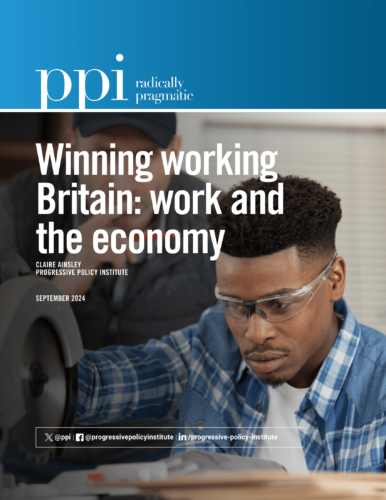WASHINGTON — The 2024 UK General Election was nothing short of extraordinary, with Keir Starmer’s Labour Party securing a sweeping victory. But beneath the celebration lies a critical divide: Labour dominated the graduate vote, yet it lagged behind among non-graduates, an electorate that remains pivotal to long-term success. If Labour wants to sustain its victory — and if Democrats in the U.S. hope to learn from it — there is work to be done.
Today, the Progressive Policy Institute (PPI) unveiled a new report, Winning Working Britain: Work and the Economy, authored by Claire Ainsley, Director of the Project on Centre-Left Renewal at PPI. The report reveals that Labour’s margin among working-class voters was far narrower than its lead among graduates, and if the party is to maintain its electoral strength, it must address the needs of non-graduates, who remain skeptical.
“Labour’s success in winning back working-class voters is a remarkable achievement, but to build a sustainable coalition, the party must pay greater attention to non-graduates,” said Ainsley. “The same lesson applies to Democrats in the U.S. who have long struggled to balance their support base between college-educated voters and those without degrees.”
The report highlights key policies favored by working-class voters, particularly non-graduates. Among these, the top priority is affordable non-degree pathways to well-paying jobs, such as short-term training programs that combine work and learning. British workers also expressed a strong desire for more well-paid jobs that don’t require a university degree, especially in trades and the digital economy — sectors they see as offering the best opportunities for their children.
“Labour’s challenge now is to deliver on these economic aspirations. By focusing on expanding non-degree career opportunities and boosting wages for those without a college education, the party can bridge the gap and ensure its long-term success,” Ainsley added.
The report concludes with actionable recommendations for center-left parties, emphasizing the need to elevate the voices and interests of non-graduates. It serves as a roadmap not only for Labour but also for Democrats in the U.S. as they seek to rebuild their own coalition ahead of the 2024 elections.
Read and download the report here.

For further U.S.-focused insights, former PPI Director of Workforce Development Policy Taylor Maag highlights better career alternatives to college and offers specific policy recommendations for the U.S. audience in her report, “Career Pathways: How to Create Better Alternatives to College.”
The Progressive Policy Institute (PPI) is a catalyst for policy innovation and political reform based in Washington, D.C. Its mission is to create radically pragmatic ideas for moving America beyond ideological and partisan deadlock. Learn more about PPI by visiting progressivepolicy.org. Find an expert at PPI and follow us on Twitter.
###
Media Contact: Ian O’Keefe – iokeefe@ppionline.org



